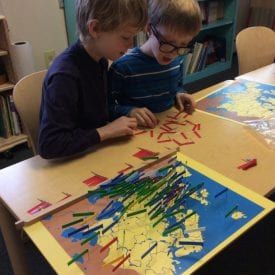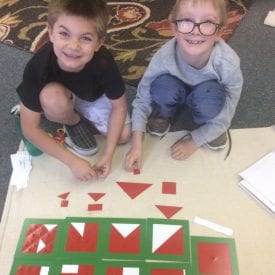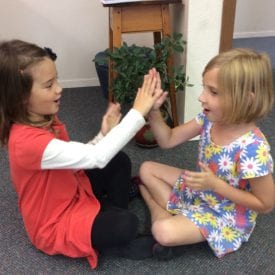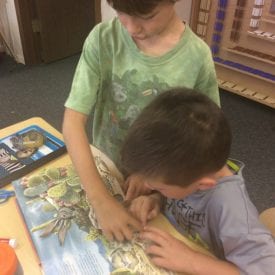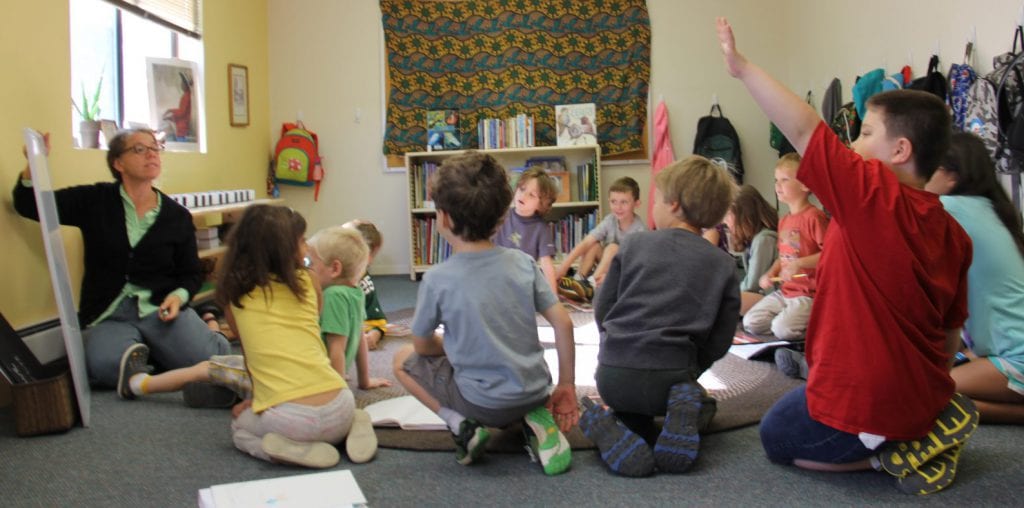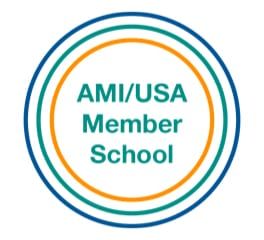Why Choose Montessori?
An Education for Life
Used with permission from the Montessori Foundation
“The Montessori approach is often described as an “education for life.” When we try to define what children take away from their years in Montessori, we need to expand our vision to include more than just the basic academic skills.
Normally, Americans think of a school as a place where one generation passes down basic skills and culture to the next. From this perspective, a school only exists to cover a curriculum, not to develop character and self-esteem.
But in all too many traditional and highly competitive schools, students memorize facts and concepts with little understanding, only to quickly forget them when exams are over. Many bright students are passive learners. They coast through school, earning high grades, but rarely pushing themselves to read material that hasn’t been assigned, ask probing questions, challenge their teacher’s cherished opinions, or think for themselves. They typically want teachers to hand them the “right answer.” The problem isn’t with today’s children, but with today’s schools. Children are as gifted, curious, and creative as they ever were, when they’re working on something that captures their interest and which they have voluntarily chosen to explore.
Montessori schools work to develop culturally literate children and nurture their fragile sparks of curiosity, creativity, and intelligence. They have a very different set of priorities from traditional schools, and a very low regard for mindless memorization and superficial learning.
Montessori students may not memorize as many facts, but they do tend to become self-confident, independent thinkers who learn because they are interested in the world and enthusiastic about life, not simply to get a good grade.
Montessori believed that there was more to life than simply the pursuit of wealth and power. To her, finding one’s place in the world, work that is meaningful and fulfilling, and developing the inner peace and depth of soul that allows us to love are the most important goals in life.\
Montessori schools give children the sense of belonging to a family and help them learn how to live with other human beings. To reduce these principles to the most simplistic form, Dr. Montessori proposed that we could make peace by healing the wounds of the human heart and by producing a child who is independent, at peace with herself, and secure. Dr. Montessori envisioned her movement as essentially leading to a reconstruction of society.
Montessori schools are different, but it isn’t just because of the materials that are used in the classrooms. Look beyond the pink towers and golden beads, and you’ll discover that the classroom is a place where children really want to be — because it feels a lot like home.”
“We were drawn to the concept of a public Montessori school. The folks at this school are caring and very helpful. Not just good teachers for the children but a great resource to parents.”
- Parent / Guardian
How an authentic Montessori school benefits the Poudre School District?
We all want our children to grow up with the best educational opportunities. As parents and community members we know it is a genuine human aspiration to want our children to be able to fulfill their potential, feel a sense of purpose, be creative, be respectful, experience a lifetime of learning and wellness, have peaceful lives, be self-reliant, find self worth, and celebrate their present moments and the best in themselves. We believe a Montessori education can provide the environment in which children, and families, can actualize all of these aspirations, if they so desire. The Poudre School District recognizes that charter schools provide important alternative educational options in our community, and it embraces school choice and a variety of educational models. Though there are other tuition-based primary (Pre-K) Montessori schools in Fort Collins, there are no other options, public or private, to continue in the Montessori model beyond the Kindergarten level.
We believe, and are supported by current educational and brain research, that the Montessori method provides a long-lasting, deep connection to learning and self-reflection. This educational model encourages independence, curiosity, concentration, joy, and excitement in learning. It also enhances a student’s sense of personal well-being and accomplishment so that the child can explore confidently his or her potential.
Education That Nurtures The Human Potential
QUICK LINKS
Fort Collins Montessori School



